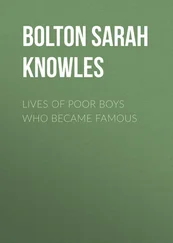Sarah Bolton - Famous American Statesmen
Здесь есть возможность читать онлайн «Sarah Bolton - Famous American Statesmen» — ознакомительный отрывок электронной книги совершенно бесплатно, а после прочтения отрывка купить полную версию. В некоторых случаях можно слушать аудио, скачать через торрент в формате fb2 и присутствует краткое содержание. ISBN: , Жанр: foreign_prose, foreign_antique, foreign_language, на английском языке. Описание произведения, (предисловие) а так же отзывы посетителей доступны на портале библиотеки ЛибКат.
- Название:Famous American Statesmen
- Автор:
- Жанр:
- Год:неизвестен
- ISBN:http://www.gutenberg.org/ebooks/39012
- Рейтинг книги:5 / 5. Голосов: 1
-
Избранное:Добавить в избранное
- Отзывы:
-
Ваша оценка:
- 100
- 1
- 2
- 3
- 4
- 5
Famous American Statesmen: краткое содержание, описание и аннотация
Предлагаем к чтению аннотацию, описание, краткое содержание или предисловие (зависит от того, что написал сам автор книги «Famous American Statesmen»). Если вы не нашли необходимую информацию о книге — напишите в комментариях, мы постараемся отыскать её.
Famous American Statesmen — читать онлайн ознакомительный отрывок
Ниже представлен текст книги, разбитый по страницам. Система сохранения места последней прочитанной страницы, позволяет с удобством читать онлайн бесплатно книгу «Famous American Statesmen», без необходимости каждый раз заново искать на чём Вы остановились. Поставьте закладку, и сможете в любой момент перейти на страницу, на которой закончили чтение.
Интервал:
Закладка:
He devoted himself untiringly to his books. He worked fifteen hours a day, allowing himself only time to run out of town for a mile in the twilight, before lighting the candles, as necessary exercise. Though, from the high social position of his mother, he had many acquaintances at Williamsburg, Thomas went little in society, save to dine with the prominent men above mentioned. These were a constant stimulant to him. A great man, or the written life of a great man, becomes the maker of other great men. The boy had learned early in life one secret of success; to ally one's self to superior men and women.
Years afterward, he wrote to his eldest grandson, "I had the good-fortune to become acquainted very early with some characters of very high standing, and to feel the incessant wish that I could ever become what they were. Under temptations and difficulties, I would ask myself, what would Dr. Small, Mr. Wythe, Peyton Randolph do in this situation? What course in it will insure me their approbation? I am certain that this mode of deciding on my conduct tended more to correctness than any reasoning powers I possessed. Knowing the even and dignified lives they pursued, I could never doubt for a moment which of two courses would be in character for them. From the circumstances of my position, I was often thrown into the society of horse-racers, card-players, fox-hunters, scientific and professional men, and of dignified men; and many a time have I asked myself in the enthusiastic moment of the death of a fox, the victory of a favorite horse, the issue of a question eloquently argued at the bar or in the great council of the nation, well, which of these kinds of reputation should I prefer – that of a horse-jockey, a fox-hunter, an orator, or the honest advocate of my country's rights?"
The very fact that Jefferson thus early in life valued character and patriotism above everything else was a sure indication of a grand and successful manhood. We usually build for ourselves the kind of house we start to build in early years. If it is an abode of pleasure, we live in the satiety and littleness of soul which such a life brings. If it is an abode of worship of all that is pure and exalted, we walk among high ideals, with the angels for ministering spirits, and become a blessing to ourselves and to mankind.
In these college-days, Jefferson became acquainted with the fun-loving, brilliant Patrick Henry, forming a friendship that became of great value to both. After two years in college, where he had obtained a fair knowledge of French, Spanish, and Italian, besides his Latin and Greek, he went home to spend the winter in reading law. But other thoughts continually mingled with Coke. On every page he read the name of a beautiful girl of whom he had become very fond. She had given him a watch-paper, which having become spoiled accidentally, the law-student wrote to his friend John Page, afterward governor of Virginia, "I would fain ask the favor of Miss Becca Burwell to give me another watch-paper of her own cutting, which I should esteem much more, though it were a plain round one, than the nicest in the world, cut by other hands." He asked advice of Page as to whether he had better go to her home and tell her what was in his heart. "Inclination tells me to go, receive my sentence, and be no longer in suspense; but reason says, 'If you go, and your attempt proves unsuccessful, you will be ten times more wretched than ever.'"
He battled with Coke all winter and all the next summer, – a young man in love who can thus bend himself to his work shows a strong will, – going to Williamsburg in October to attend the General Court, and to meet and ask Miss Burwell for her heart and hand. Alas! he found her engaged to another. Possibly, he was "ten times more wretched than ever," but it was wise to know the worst.
A young man of twenty-one usually makes the best of an unfortunate matter, remembering that life is all before him, and he must expect difficulties. The following year, a sister married one of his dearest friends, Dabney Carr; and the same year, 1765, his pet sister, Jane, died. To the end of his life, he never forgot this sorrow; and, even in his extreme old age, said "that often in church some sacred air, which her sweet voice had made familiar to him in youth, recalled to him sweet visions of this sister, whom he had loved so well and buried so young."
After five years spent in law studies, rising at five, even in winter, for his work, he began to practise, with remarkable success. He was not a gifted speaker, but, having been a close student, his knowledge was highly valued. Years afterward, an old gentleman who knew Jefferson, when asked, "What was his power in the court-room?" answered, "He always took the right side."
Parton says, in his valuable life of Jefferson, "He had most of the requisites of a great lawyer; industry, so quiet, methodical, and sustained that it amounted to a gift; learning, multifarious and exact; skill and rapidity in handling books; the instinct of research, that leads him who has it to the fact he wants, as surely as the hound scents the game; a serenity of temper, which neither the inaptitude of witnesses nor the badgering of counsel could ever disturb; a habit of getting everything upon paper in such a way that all his stores of knowledge could be marshalled and brought into action; a ready sympathy with a client's mind; an intuitive sense of what is due to the opinions, prejudices, and errors of others; a knowledge of the few avenues by which alone unwelcome truth can find access to a human mind; and the power to state a case with the clearness and brevity that often make argument superfluous."
In 1768, when he was only twenty-five years old, he offered himself as a candidate for the Virginia Legislature, and was elected. He entered upon his public life, which lasted for forty years, with the resolution "never to engage, while in public office, in any kind of enterprise for the improvement of my fortune;" and he kept his resolution.
Two years after he began to practise law, the house at "Shadwell" was burned. He was absent from home, and greatly concerned about his library. When a colored man came to tell him of his loss, Jefferson inquired eagerly for his books. "Oh," replied the servant, carelessly, "they were all burnt, but ah! we saved your fiddle!"
A new house was now begun, two miles from the Shadwell home, on a hill five hundred and eighty feet high, which he called afterwards "Monticello," the Italian for "Little Mountain." This had long been a favorite retreat for Jefferson. He and Dabney Carr had come here day after day, in the summer-time, and made for themselves a rustic seat under a great oak, where they read law together, and planned the rose-colored plans of youth. Sweet, indeed, is it that we have such plans in early years. Those get most out of life who live much in the ideal; who see roses along every pathway, and hear Nature's music in every terrific storm.
Jefferson was building the Monticello home with bright visions for its future. Another face had come into his heart, this time to remain forever. It was a beautiful face; a woman, with a slight, delicate form, a mind remarkably trained for the times, and a soul devoted to music. She had been married, and was a widow at nineteen. Her father was a wealthy lawyer; her own portion was about forty thousand acres of land and one hundred and thirty-five slaves. Although Jefferson had less land, his annual income was about five thousand dollars, from this and his profession.
Martha Skelton was now twenty-three, and Jefferson nearly twenty-nine. So attractive a woman had many suitors. The story is told that two interested gentlemen came one evening to her father's house, with the purpose of having their future definitely settled. When they arrived, they heard singing in the drawing-room. They listened, and the voices were unmistakably those of Jefferson and Martha Skelton. Making up their minds that "their future was definitely settled," as far as she was concerned, they took their hats and withdrew.
Читать дальшеИнтервал:
Закладка:
Похожие книги на «Famous American Statesmen»
Представляем Вашему вниманию похожие книги на «Famous American Statesmen» списком для выбора. Мы отобрали схожую по названию и смыслу литературу в надежде предоставить читателям больше вариантов отыскать новые, интересные, ещё непрочитанные произведения.
Обсуждение, отзывы о книге «Famous American Statesmen» и просто собственные мнения читателей. Оставьте ваши комментарии, напишите, что Вы думаете о произведении, его смысле или главных героях. Укажите что конкретно понравилось, а что нет, и почему Вы так считаете.












